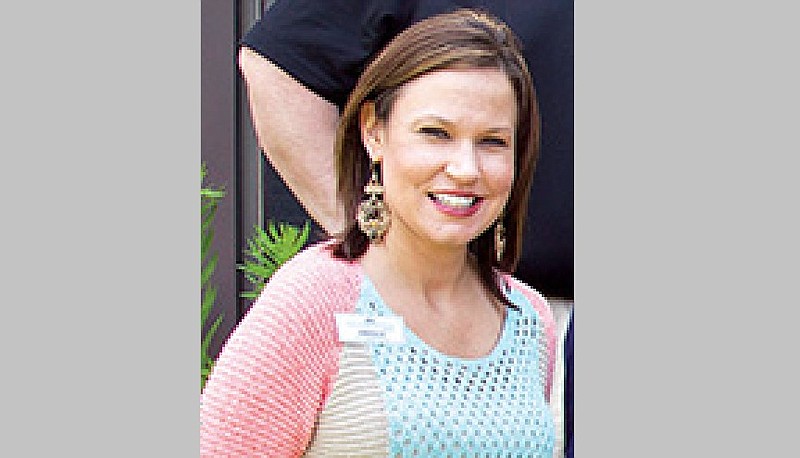LITTLE ROCK -- A Searcy woman who charmed customers and fellow employees alike during at least 15 years as a branch manager for First Community Bank was sentenced Thursday to 18 months in federal prison and was ordered to repay $329,240 that she admitted stealing from customers over four years.
Amanda McClish, 42, pleaded guilty Jan. 30 to an embezzlement charge, admitting that from September 2014 through July 2018, she pilfered funds from 18 customers between the ages of 55 and 94, including 10 who were older than 80, while managing two bank branches in Searcy. First Community Bank has its headquarters in Batesville.
Laura Brissey, the bank's executive vice president and general counsel, testified that McClish "was a really popular employee with our customers. They all really liked and trusted her."
She said McClish "had close relationships with a lot of her customers, and knew their families," and was considered a "best practices" model for the bank, which prides itself on being community-oriented and getting to know its customers personally.
But on July 5, 2018, while McClish was on vacation, a customer called seeking help with a problem. Brissey said McClish had closed the man's account and opened a new one, but deposited $5,000 less in the new account.
Brissey said that query initiated an internal audit that "looked back at almost everything she touched in a seven-year period before that," leading to the discovery that McClish had used a variety of ways to pilfer from the accounts of well-off, mostly elderly customers who didn't do online banking, which would have enabled them to regularly check transactions.
She said many of the accounts were certificate-of- deposit accounts for which the customer wouldn't receive a notice until the account approached maturity. As the maturity date approached, McClish would take actions to make sure the customers didn't get the notice, even in one case creating an elaborate email chain falsely indicating that a customer was going overseas with her sister and wanted the statement held for her at the bank.
McClish got into other customers' accounts and changed their addresses to prevent them from receiving mailed statements, Brissey testified.
The bank executive said McClish even had other bank employees she supervised unwittingly help her by ordering them to create cashier's checks from customers' accounts and then cash them, "in the name of customer service, to have cash ready before the customer arrived." But in reality, Brissey said, McClish tucked the cash into her purse.
While Assistant U.S. Attorney Amanda Jegley asked U.S. District Judge Kristine Baker to sentence McClish to the high end of a 27- to 33-month penalty range recommended by federal sentencing guidelines, defense attorney Hubert Alexander of Jacksonville argued for leniency.
He pointed out the bank reimbursed the customers, and the bank's insurance company covered at least part of the loss. Noting that no other customers ever complained, he waved off Brissey's testimony that the audit only reached back seven years because of the statute of limitations, which means there could have been more money taken over the years than what was discovered.
Alexander also cited McClish's statement to probation officers that she spent part of the money on cocaine and alcohol. He said she didn't live a lavish lifestyle because "she didn't need anything. She was married, had a home and children, and was paid a good living wage of $45,000 a year," indicating she suffered from an addiction rather than greed.
McClish's husband told Baker from a courtroom lectern that the revelation about the theft "has frankly brought us closer, and it has uncovered some stuff for me. I do not want to lose my wife."
Baker also heard from McClish's current employer of two years, where she works as the business manager, handling money despite her guilty plea. He told the judge, "She deserves a second chance and I would love to keep her employed."
McClish herself apologized for "my selfishness and stupidity," adding, "I understand I'll have to work longer and harder to repay the bank for my actions."
Baker, who said she had read letters from victims, McClish's family members and members of the community, took a couple of recesses to weigh a potential sentence, then returned to the bench and noted that McClish "has struggled with addiction issues and mental health issues for some time," as indicated in a sealed presentence report.
The judge said she was left with the impression that "this illegal conduct was out of character for Ms. McClish."
She said she also considered, in deciding to sentence McClish below the suggested penalty range, that time spent in jail now, with the Covid-19 pandemic in full swing across the country, including in many prisons where inmates are in close quarters, "is different from the time before Covid."
For those reasons, she said, "On the court's own motion, I am considering varying down."
Jegley, who took over the case from her mother, recently retired Assistant U.S. Attorney Angela Jegley, argued that the four-year period for which McClish was charged with embezzling indicated that the criminal conduct was a reflection of her true character.
Baker instead imposed the 18-month sentence along with a recommendation that McClish be housed at a federal facility that operates a drug and alcohol program, and ordered that she receive mental health counseling.
"Ms. McClish," she said, "you have shown grace and mercy to certain people ... and I would encourage you to show some to yourself. Substance abuse is not going to help. I encourage you to break that cycle and move through this."
